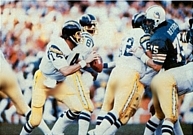
The National Football League playoffs for the 1982 season began on January 8, 1983. The postseason tournament concluded with the Washington Redskins defeating the Miami Dolphins in Super Bowl XVII, 27–17, on January 30, at the Rose Bowl in Pasadena, California.
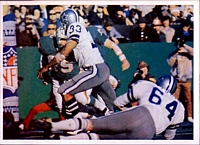
The National Football League playoffs for the 1971 season began on December 25, 1971. The postseason tournament concluded with the Dallas Cowboys defeating the Miami Dolphins in Super Bowl VI, 24–3, on January 16, 1972, at Tulane Stadium in New Orleans, Louisiana.

The 1977 NFL season was the 58th regular season of the National Football League. The two second-year expansion teams switched conferences, with the Seattle Seahawks moving from the NFC West to the AFC West, and the Tampa Bay Buccaneers transferring from the AFC West to the NFC Central.
The 1974 NFL season was the 55th regular season of the National Football League. The season ended with Super Bowl IX when the Pittsburgh Steelers defeated the Minnesota Vikings. Players held a strike from July 1 until August 10, prior to the regular season beginning; only one preseason game was canceled, and the preseason contests were held with all-rookie rosters.
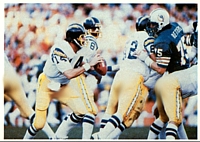
The Epic in Miami was the National Football League AFC divisional playoff game between the San Diego Chargers and Miami Dolphins that took place on January 2, 1982 in the Miami Orange Bowl. The game, won by the Chargers in overtime, 41–38, is one of the most famous in National Football League lore because of the enormity of scoring, the conditions on the field, the performances of players on both teams, and the numerous records that were set.

The 2004 New York Jets season was the franchise's 35th season in the National Football League (NFL), the 45th season overall, and the fourth under head coach Herman Edwards.

The Dolphins–Jets rivalry is a National Football League (NFL) rivalry between the Miami Dolphins and New York Jets.
The Miami Dolphins are a professional American football franchise which competes in the National Football League (NFL) as a member club of the league's American Football Conference (AFC) East division. The team's headquarters, stadium and training facilities are all co-located in Miami Gardens, Florida. The Dolphins' team was founded by attorney-politician Joe Robbie and actor-comedian Danny Thomas. The Dolphins began play in the American Football League (AFL) in 1966. South Florida had not had a professional football team since the days of the Miami Seahawks, who played in the All-America Football Conference (AAFC) East Division in 1946 before becoming the first incarnation of the Baltimore Colts.

The San Diego Chargers were a professional American football team in the National Football League (NFL). The Chargers played in San Diego from 1961 until the end of the 2016 season, before relocating back to the Greater Los Angeles area, where the franchise played its inaugural 1960 season. The team is now known as the Los Angeles Chargers.
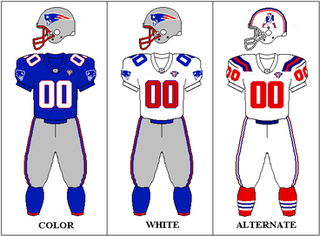
The 1994 New England Patriots season was the team's 35th season, and 25th in the National Football League (NFL). It was the first under owner Robert Kraft, who purchased the team after preventing previous owner James Orthwein from moving the Patriots to St. Louis. The Patriots finished the season with a record of ten wins and six losses, and finished tied for first in the AFC's East division.
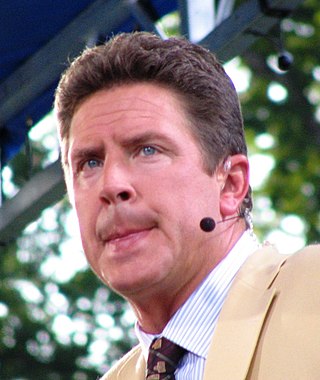
Daniel Constantine Marino Jr. is an American former professional football player who was a quarterback in the National Football League (NFL) for 17 seasons with the Miami Dolphins and has worked with them since 2014 as a special advisor. He played college football for the Pittsburgh Panthers, earning first-team All-American honors in 1981. Marino was the last quarterback taken in the first round of the famed quarterback class of 1983. He held or currently holds dozens of NFL records associated with the quarterback position, and despite never being on a Super Bowl-winning team, he is recognized among the greatest quarterbacks in American football history.

The Monday Night Miracle was an NFL Monday night game between the New York Jets and Miami Dolphins played at Giants Stadium on October 23, 2000. The Jets scored 30 points in the fourth quarter, twice tying the score, and sending the game into overtime, where they defeated the Dolphins, 40–37.

The 1972 Miami Dolphins season was the franchise's seventh season and third in the National Football League (NFL). The team was led by third-year head coach Don Shula and achieved the only perfect season in NFL history. It also led the league in both points scored and fewest points allowed.

The 2008 New York Jets season was the franchise's 39th season in the National Football League (NFL), the 49th season overall, and the third and final under head coach Eric Mangini. The team succeeded in improving upon their 4–12 record from 2007, but did not make the playoffs for the second straight season.

The 1982 Miami Dolphins season was the team's seventeenth in the National Football League (NFL). The Dolphins were coming off an unexpected 11–4–1 1981 season and a devastating loss to the San Diego Chargers in the Divisional Round the previous season in a game dubbed the Epic in Miami. The team had clinched the 2 seed and were picked by many to reach the Super Bowl during the 1981 season. Because of the high number of picks to reach the Super Bowl the previous season, many more fans picked them to win it during the 1982 season. The Dolphins looked to improve on their 11–4–1 record from 1981. However, a players strike cancelled 7 of the team's 16 games. Because of this, the NFL schedule was shrunk to 9 games.
The 1994 Miami Dolphins season was the franchise's 29th season of existence and 25th in the National Football League (NFL). On March 23, the NFL approved the transfer of majority interest in the team from the Robbie family to Wayne Huizenga. The team's playoff win on New Year's Eve 1994 vs. Kansas City is now famous as the last NFL game that Joe Montana ever played, as the superstar QB retired in the off-season.

The 2000 Miami Dolphins season was the franchise's 31st season in the National Football League, the 35th overall and was their first under new head coach Dave Wannstedt who was named the fourth head coach in franchise history on January 16, 2000, the same day that Jimmy Johnson announced his retirement from coaching. For the first season since 1982, Dan Marino was not on the opening day roster, as he announced his retirement prior to the season. Believed by many as the greatest Miami Dolphin of all time, Marino led the Dolphins to ten playoff appearances, one of which ended in Super Bowl XIX, and is the winningest quarterback to have not won a Super Bowl. Jay Fiedler, who left the Jacksonville Jaguars, succeeded Marino as starting quarterback. Damon Huard remained a backup quarterback and started for Fiedler in one game during the season.
The 2000 Buffalo Bills season was the team's 41st and 31st as part of the National Football League. The Bills total offense ranked 9th in the league and their total defense ranked 3rd in the league. The 2000 season was the first since the 1987 season that long-time Bills players Bruce Smith, Andre Reed and Thurman Thomas were not on the team together, as all were released just days after the Bills were eliminated from the 1999 playoffs. Smith and Reed signed with the Redskins, while Thomas signed with the Dolphins. The Buffalo Bills finished in fourth place in the AFC East and finished the National Football League's 2000 season with a record of 8 wins and 8 losses. Though the Bills were 7–4 after eleven games, they lost their next four in a row, only avoiding a losing season in the final game of the year.

The Bills–Dolphins rivalry is a National Football League (NFL) rivalry between the Buffalo Bills and Miami Dolphins.

The Miracle in Miami, also known as the Miami Miracle, was an American football play that took place at the end of a National Football League regular season game on December 9, 2018, between the Miami Dolphins and the New England Patriots. It was the first walk-off touchdown in NFL history to involve multiple lateral passes, and the first multi-lateral touchdown since the River City Relay in December 2003. After the game, the play was known by several names, most commonly the "Miami Miracle" and the "Miracle in Miami". The play went on to win the Bridgestone Performance Play of the Year Award at the 8th Annual NFL Honors awards show on February 2.
